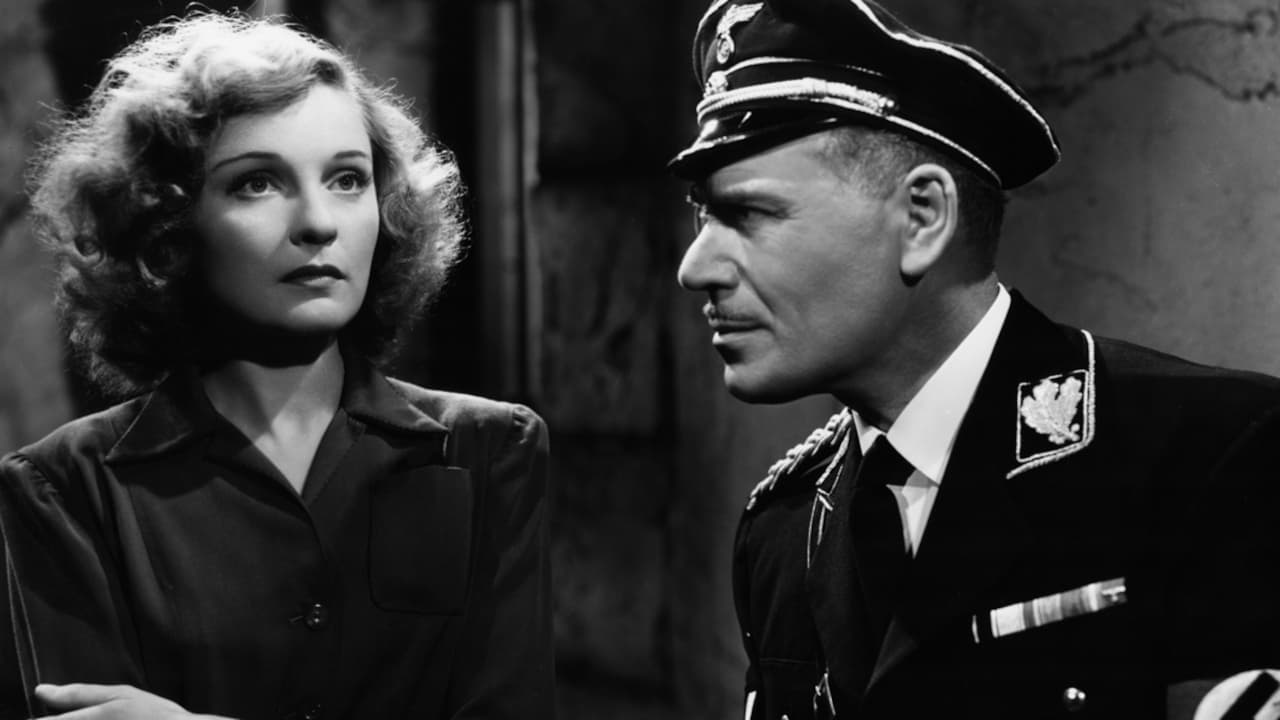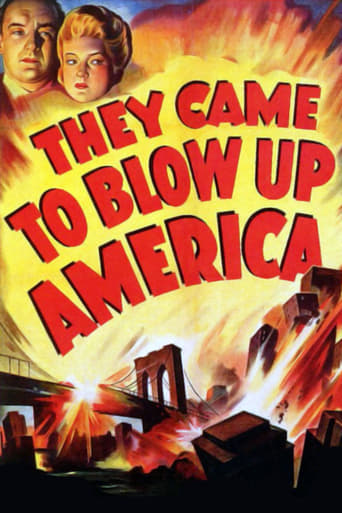LouHomey
From my favorite movies..
Stellead
Don't listen to the Hype. It's awful
2freensel
I saw this movie before reading any reviews, and I thought it was very funny. I was very surprised to see the overwhelmingly negative reviews this film received from critics.
Sharkflei
Your blood may run cold, but you now find yourself pinioned to the story.
Robert J. Maxwell
This is a hastily slapped-together but enjoyable fictional treatment of an incident from the early years of the war, in which half a dozen Nazi saboteurs land on the coasts of Long Island and Florida with instructions to attack aluminum plants and other targets.Some of the scenes are dragged out and lack pep despite the strutting and throwing of ceramics, but they're not really boring because the whole story is rushing headlong at such a pace. (A more important weakness is that these comic scenes are supposed to be funnier than they are.) The film needed an editing that it didn't get, probably because the incident itself took place in June, 1942, and the film was rushed through to cash in on the sensation. That's what I mean by "hasty." George Sanders is the fabricated FBI agent sent to Germany under another identity. His mission: attend the Nazi espionage school and find out what they're up to. But unexpectedly he finds himself ordered to keep an eye on a blond suspected of being a dissident -- Poldi Dur, who is a winning presence. He saves her from the jaws of death, so to speak, and then is assigned to lead the team of genuine saboteurs.The saboteurs land in a fog at Amagansett, Long Island, and begin to dispose of the evidence of their intentions. Two points about this scene.One is that I was glad they landed at Amagansett because the civilians there are all too comfortable. It's a tony residential beach-front settlement and everyone sits around and listens to Borodin, nibbles on the occasional amuse-bouche, and sips martinis while playing bridge. A little entropy never hurt anyone.The second point is that these miscreants are interrupted by the arrival of a Coast Guardsman, who appears to accept their lies and the three-hundred dollar bribe (the historical amount). However, this Coast Guardsman takes off and reports the entire incident to his superiors, leading to the ultimate capture of all eight of them, and the execution of six. I thought it was an accurate depiction of Coast Guard integrity. I spent four of the most productive years of my life in the U. S. Coast Guard, and everyone I worked with was a treasure. Well, except for one chief boatswain's mate whose name, Montmorency Queeg Malon, will go unmentioned here.I'm having fun at the expense of the movie but I'm following its spirit. None of it is to be taken seriously. The suspense is limited because it's evident from the start that nothing tragic will happen. And it doesn't. The good guys win. The bad guys are blown up.There are some decent documentaries available free on YouTube that deal with "Operation Pastorius," as the mission was called.
blanche-2
"They Came to Blow up America" looks to be a B movie. It stars the suave, always reliable George Sanders as Steelman, an American of German heritage who is recruited by the FBI to infiltrate the Nazis as a spy. Even his parents believe that he has joined the Nazi movement. He is given the identity of someone else and sent to Germany, eventually ending up on a saboteur mission.The film is told in flashback, with the FBI man who recruited Steelman (Ward Bond) explaining to an underling what really went on.Sanders is good. He played villains well, so during the war, he was often cast as a Nazi! The supporting cast includes Anna Sten and Ludwig Stossel, who plays Steelman's father.Ward Bond was a best friend of Clark Gable, and I couldn't help but notice the similarity of their voices in this film. Even their speaking rhythm was similar. Close your eyes, and you'd swear it was Gable.
LCShackley
This is a fine example of the kind of patriotic films that were produced by Hollywood during the Second World War, a far cry from the anti-American, terrorist-sympathetic views being promoted by contemporary filmmakers.George Sanders, a successful mining engineer working in South America, returns home to visit his German immigrant parents, who are unashamedly patriotic about the USA. They are dismayed to find that Sanders is working for the German-American Bund, a pro-Nazi group active in the early years of the war.But there is more to the story. The plot gets more involved, as secret missions and identities are revealed, and betrayals threaten the lives of the main characters. In the end, a gang of Nazi saboteurs is rounded up and executed, much to everyone's satisfaction.THEY CAME TO BLOW UP America (what an ominous title for us today!) reveals how attitudes have changed in the film industry over the past 60+ years. This film is not ashamed to be overtly pro-American. No one hesitates when it comes to punishing members of anti- American organizations. And no one bats an eye when a teacher talks about using his belt to keep ornery grade school kids in line! This is a fine example of a WW2 espionage movie designed to stir the sentiments of the American viewing audience.
boblipton
The first person we see in this movie is Ludwig Stossel, best remembered as the father of Lou Gehrig in PRIDE OF THE YANKEES. He is German, naturlich, and has spent the last twenty years teaching in Milwaukee, so of course, his son is George Sanders with that British Public School Accent. Oh well.Still, the story is a good one, based on a true incident, and for an apparent B movie, the acting, direction and photography -- by the wonderful and sadly forgotten Lucien Andriot -- are well up to par. Notice, for example, whose picture is on the dartboard at SS headquarters. And besides Mr. Stossel, we see some wonderful supporting actors, including Anna Sten, Ward Bond and Sig Ruman. So, while this is not a great movie, it is certain worth your time

